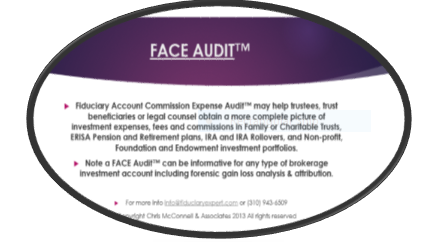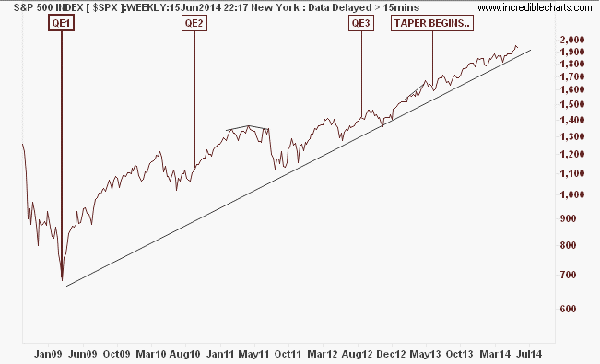We wrote ten years ago in 2004 about hedge funds, including suggestions and questions to improve prudence. Recently, CalPERS seems to have determined for itself the costs, risks and returns were not worth it. They have simply announced they will get out of all $4 Billion invested in hedge funds.
2016 Update: New Jersey State Pension Investment Council announces it will reduce allocations to alternative investments and look to pay reduced fees, targeted at 50% less. And announced it will conduct a forensic audit of investment and performance fees paid, up about 50% since 2013.
The boards initiated audits for fees and bonuses paid since the 2012 fiscal year. Board members said they have a fiduciary responsibility to investigate those costs.
The State of New York Employees pension plan will also trim its hedge funds, similar alternative investments, adopt new pension board transparency measures, banning investment advisers who make political contributions to the State Comptroller or candidates for that office, install a special inspector general and ethics officer, and require ethics training.
Today in 2014, ten years later.
Are Hedge funds appropriate for Private Trusts, Pension plans or Non-profits, Foundations or Endowments?
If CalPERS, with thousands of (internal and external) professional man hours annually devoted to hedge fund due diligence, surveillance, and risk and return analysis exited their hedge fund investments, should private trusts, pension plans and or charities, foundations and endowments invest or hold onto their hedge fund investments? Are trustees assuming they have properly delegated and that their investment advisers, stockbrokers or financial planners are actually doing the work a fiduciary ought to as opposed to simply mouthing the words “don’t worry, we’ll take care of everything”?
Reprint in the entirety of our 2004 Fiduciary Caution – Hedge Fund Alert
Fiduciary Caution – Hedge Fund Alert
- Liquidity issues
- Lack of Transparency
- Leverage
- Lexicon – New investment jargon appears
In the unending quest for improved investment performance investors often look to the latest hot product…in this case HEDGE FUNDS. It may be OK for an investor to take a “flier” it is imprudent for a Trustee to do so.
Trustees are strongly advised to exercise increased caution and employ stringent checks and balances to address, monitor and document all due diligence PRIOR to the use of any hedge fund or alternative investment product.
- Employing hedge funds or similar “alternative investments” will increase the already heavy burden on the fiduciaries’ shoulders. A concomitant increase in litigation for breach of fiduciary duty would not be surprising.
- In our humble opinion, it is not a question of if, rather it is a question of when one of these products will blow up again.
- Long Term Capital Management (LTCM) with the “intellectual capital” of 2 Nobel prize winners imploded the global bond and currency markets in 1998 due to the abundant use of leverage.
- Common sense should help guide us. If all it took was smarts and brains to make a lot of money on Wall St. the following statement would then be true: “All the PhD’s in Economics in the world are the wealthiest.” We can quickly see that it takes a lot more than “intellectual capital”.
- Is there a genuine need to use hedge funds – has the trust portfolio run out of traditional investment options in order to achieve the modeled investment risk and return parameters?
- Has the time horizon of the trust or pension plan changed since the last asset allocation study?
- Trustees need to be completely satisfied that any restrictions on redemptions or liquidity do not negatively impact the projected cash flow requirements of the trust. When was the most recent cash flow requirement performed? Did any assumptions change? Why or why not?
- Has the specific hedge fund under consideration exhibited similar risk / return characteristics to its own species? If not, is its unique risk / return pattern available in the traditional world of investments?
- Has the issue of survivorship bias been sufficiently researched and addressed?
- Has the hedge fund been measured against required fiduciary due diligence criteria as stated in the trust’s investment policy statement? Has the criteria been updated? Has the trust or pension plan been examined for compliance with the fiduciary duties?
- Hedge funds’ lack of transparency, use of margin (leverage), “side letters” for preferred investors, internal risk management, external risk controls; especially related to counter-party transactions of other unregulated entities bears most of the usual markings of “this time is different think” when we know it won’t be.
- Finally, once the trustee has performed or preferably enlisted an independent expert to evaluate the prudence of the process used to select the hedge fund we would encourage a dollar cost averaging investment approach over several years, without penalty for terminating the investment program.
- Many hedge funds operate or are linked to off-shore entities – trustees need to ensure that they do not relinquish any legal rights, remedies or privileges due to off-shore status.
- Have trustees investigated relevant income and / or estate tax implications?
- “FWIW” – nearly every insurance company announced plans to cancel brokerage firms’ excess SIPC insurance in August 2003. Prominent among the concerns were the risks inherent in the hedge fund industry as well as the lack of transparency and the inability to see all the way through the hedge fund “food chain”. Brokerage firms self-insure to provide this coverage.
- As opposed to our UK trustees and readers, US trustees do not enjoy the privilege (“the trustee’s partial mulligan”) of Hastings Bass where trustees can admit to a mistake and be excused after the fact.
More information > info@fiduciaryexpert.com
End of 2004 Fiduciary Caution – Hedge Fund Alert.
The answers to the question: Is this the correct investment, asset allocation, insurance, investment policy strategy or course of action, as always and at all times, should only be the result of prudence in action.
For assistance see support@fiduciaryexpert.com or (310) 943-6509
Copyright Chris McConnell & Associates 2004 to 2016 All rights reserved



